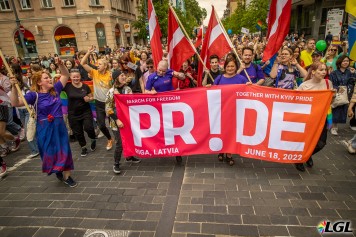The Latvian capital is a surprising choice for the pan-European LGBT Pride celebration, but locals and organizers have high hopes that the positive impact will be long-lasting.
A decade ago, two young Latvians, fresh from volunteering at Stockholm Pride, decided the time was right for Riga to host its own festival. They planned a small parade through the capital’s old town and applied to the city council for permission. Perhaps without quite realizing what it was getting itself into, the council accepted the proposal. Latvia was to get its very first public LGBT event, and no one knew what to expect.
That changed when a local Catholic church caught wind of the plans. Incandescent with anger at the idea of homosexuals flagrantly capering past their sacred space, the church united with some equally outraged politicians to ban the event. The council conformed in a decision that drew widespread media reportage. Riga Pride was now national news, and when a court overturned the council’s festival ban two days later, the coverage intensified.
Seventy LGBT activists took to the streets of Riga on July 22, 2005. They were met by thousands of protesters. If the message of the council hadn’t been clear before, the protesters were clarifying now: Homosexuality had no place in Latvia.
Tensions escalated and an overwhelmed and underprepared police force formed a protective ring around the participants and altered the parade’s route. As things turned violent, members of a nearby Anglican church offered the parade participants sanctuary. They waited there for hours while the police attempted to clear the crowd. When they eventually emerged through a back door, they were pelted with eggs and vegetables by defiant protesters.
Latvia’s first and only LGBT organization, Mozaika, was born out of the homophobia experienced that day. Since then, its members have persevered and transformed Riga Pride into an annual event, one which now attracts thousands of participants. Though it still faces vocal opposition and repeated attempts to ban it, protester enthusiasm has dwindled to the extent that only a few hundred bothered counter-demonstrating in 2014.
It’s a sign of progress, but the reality is that the annual festivities of Pride are a brief hiatus from the closet for the country’s LGBT community. Latvia remains a deeply conservative society, one influenced by its powerful Russian neighbors and religious tradition. With homophobia still rampant, LGBT visibility is negligible. Those who are out in public face marginalization, verbal abuse, and violence.
This June, 10 years after that first march, EuroPride will parade through the capital in all its feathered glory. It could be the catalyst to change that Latvia’s LGBT community so desperately needs.
Please read more information here.




